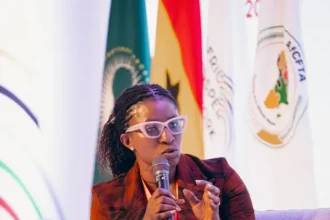The second deputy governor of the Bank of Ghana (BoG), Mrs Elsie Addo Awadzi, has motivated female entrepreneurs in the country to develop innovative mechanisms through financial technology (fintech) to increase their access to financial capital.
While bemoaning the participation of women who are entrepreneurs in Ghana’s fast-growing technology sector remains marginal, she pointed out that numerous potentials were in the fintech space for them.
The deputy governor recognised that the country’s private sector was dominated by women entrepreneurs, second, only to Uganda, according to the 2019 MasterCard Index of Women Entrepreneurs.
Nonetheless, women entrepreneurs in Ghana are 8% less likely than men to get access to the kind of capital and other financial services and products that they need to start or scale up their businesses, according to the World Bank’s 2017 Global Findex Survey.
In addition to this, data suggests that women-owned businesses tend to remain smaller and less profitable than those of men, owing in part to the lack of access to business support services and lack of access to finance.
She, therefore, reminded them, “Ghana’s budding fintech sector provides many opportunities that women entrepreneurs in the technology space could explore within the Bank of Ghana’s Regulatory Sandbox environment to test innovative applications that would help expand access to finance, particularly for women entrepreneurs like yourselves.”
Mrs Awadzi added that the Central Bank remained committed to promoting a policy and regulatory environment that supports inclusive and broad-based economic growth where all economic actors.
She stated that particularly for women and youth entrepreneurs, BoG has strengthened its policies to enamel them to have access to innovative and appropriate forms of finance at cost-effective rates.
This effort by the central bank, she said, was to help launch, grow, and sustain their businesses.
She was speaking at the graduation ceremony for cohort one of the Standard Chartered Bank (Ghana) women in technology business incubator programme on Thursday, September 16.
Having noted that it was important for women entrepreneurs to capitalise on opportunities in the fintech sector, Mrs Awadzi, called on other banks to help address the current gap in access to finance and business support services for women and youth entrepreneurs through innovative partnerships.
She said the Ghana Sustainable Banking Principles served as a foundation for this support she said, “it is imperative for all hands to be on deck as we find solutions to Ghana’s developmental challenges and ensure that no one is left behind in the new normal.”
Advice to women entrepreneurs
The second deputy governor underscored that business success required consistency, tenacity, and a commitment to following relevant rules, standards, and ethics to create lasting value for all stakeholders.
Therefore, she encouraged women entrepreneurs to uphold the high standards of business management and entrepreneurship and resolve to build strong and competitive businesses that would stand global competition.
“You have what it takes to become global players, with innovative technology-based business management tools and digital payment platforms that are currently available,” she stated
About the women in technology business incubator programme
The women in technology business incubator programme was launched in November 2020 by the Standard Chartered Bank (Ghana) and its partner, the Ghana Climate Innovation Centre of Ashesi University.
Under the theme, “technology, gender and development – expanding the role of technology in women-owned businesses for national development,” WIT sort to provide essential technology-driven solutions and support to women entrepreneurs.
The programme, therefore, set out to provide business incubation and financial support to women-led or women-owned businesses that desired to launch new technologies or grow their businesses with technology, while making a significant impact in their communities.
In all, 220 women applied, out of which 14 were selected to receive entrepreneurship skills training over a four-month period.
Thereafter, five of them received additional business support over a 10-week period and a grant of GH₵57,000 each to help scale up their businesses.
READ ALSO: Govt Allocates 20% Of Procurement Contracts To Women
















